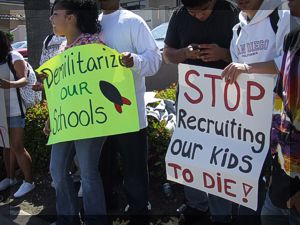
| From Draft NOtices, October-December 2017 Feeding the Deportation Pipeline: Caveat Recruitees— Isidro Ortiz |

|
|||
A previous Draft NOtices article, “Removing a Few Bad Hombres” (July-September 2017), discussed the deportation of immigrant military veterans. Non-citizen immigrant recruits in the United States now find themselves possibly facing a similarly cruel and irreversible fate. In this case their potential deportation is not due to any criminal actions on their part. Instead its roots lie in Department of Defense (DoD) proposal to terminate the Military Accession Vital to the National Interest (MAVNI) program over security concerns. The program’s end would result in the cancellation of enlistment contracts with non-citizen recruits. As reported in media venues such as NPR, this action would leave 1,000 non-citizen recruits without legal protection from deportation. Their plight is yet another reminder of the highly problematic and untrustworthy nature of the institutional commitment to those who aspire to serve in the military. However, unlike others who have been victims of broken promises and lies, these individuals face not only frustration and disappointment but also the prospect of finding themselves bureaucratically dumped into the military-to-deportation pipeline. The MAVNI program was established in 2008 to allow a limited number of non-citizens with only temporary visas to join the U.S. military. It “is designed to attract two types of recruits into the military: (a) health care professionals and (b) individuals who possess critical foreign language skills.” The enlistment incentive has been the opportunity of an expedited path to U.S. citizenship, i.e., a fast track to citizenship. Although taken by surprise the recruits have refused to become passive victims. Several have initiated litigation against the Department of Defense. Mahlon Kirwa, Santhosh Meenhallimath and Ashok Viswanathan, individuals serving in the “Select Reserve,” for example, joined as plaintiffs on their behalf and other recruits. In their suit, Kirwa et al., v. United States Department of Defense, they allege that they and others are “are the victims of a misguided and unlawful attempt to deprive them of their right to seek United States citizenship.” They claim that “as non-citizen soldiers serving honorably during wartime,” they “have an absolute statutory right to apply to become naturalized U.S. citizens, but the DoD is refusing to certify their naturalization application eligibility as required by law, leaving these soldiers to languish in immigration limbo, notwithstanding their military service to this Nation.” Such actions on the part of the DoD, the plaintiffs also claim, “are contrary to law and lack the honor, loyalty, and respect that Defendants owe to these Plaintiff-soldiers.” Opposition to ending the program has emerged from sectors other than the reservists themselves. Some observers have warned that termination of the program “would affect the ability of the military to execute its mission around the world.” Some of the possible blowback is not readily obvious. For example, MAVNI provides dentists for the Army Reserve Dental Program. Citizenship has been the main incentive for foreign-born recruits who want to participate in the program. The recruits, like their non-medical counterparts, have been highly motivated recruits. Moreover, in the case of recruits with linguistic skills, the recruits reduce the costs of acquiring linguists with specialized language fluency and literacy in languages such as Mandarin. The opposition has catalyzed some members of Congress to question the proposal but, thus far, no action has been taken. This article is from Draft NOtices, the newsletter of the Committee Opposed to Militarism and the Draft (http://www.comdsd.org/). |
||||